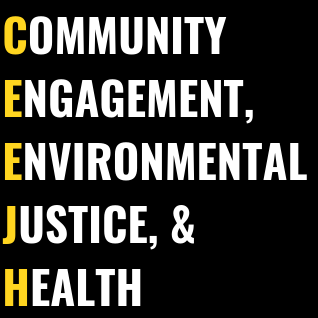Research Translation
According to the CDC, translational research is when “the outputs of basic and applied research can be effectively translated into practice and have an impact. This includes studying how knowledge and interventions are spread, accepted, applied, and institutionalized.” NIEHS highlights translational research via the phrase “data to knowledge to action,” demonstrating the “cascade from research results into a collective body of knowledge that ultimately informs and supports public health action.”
Justice-focused science communication aims to promote an equitable, inclusive, and accessible method of research translation. Injustices often originate from, and are shaped by, forces outside of a community which internal collective action cannot remedy because long-term solutions are at broader scales than the community of place. Place-based communities are heavily shaped by wider politics of power and resource access and in this way, become delocalized. Because there are ubiquitous forces that delocalize communities, community citizen science and justice-focused science communication is essential and necessary.
Boyer’s Model of Scholarship which include the scholarships of discovery, integration, teaching, engagement, and application, is a model CEEJH uses to execute justice-focused science communication and research translation. It is necessary to utilize all five of these dimensions in order to holistically assess and solve local health problems, reduce disparities, and INpower communities. CEEJH shares a vision for large-scale crowd science communication with massive participation of local communities of interest to advance environmental justice. We view community science and justice-focused science communication as valid and powerful strategies to rapidly broaden community engagement, increase environmental health literacy, and address environmental health disparities.

